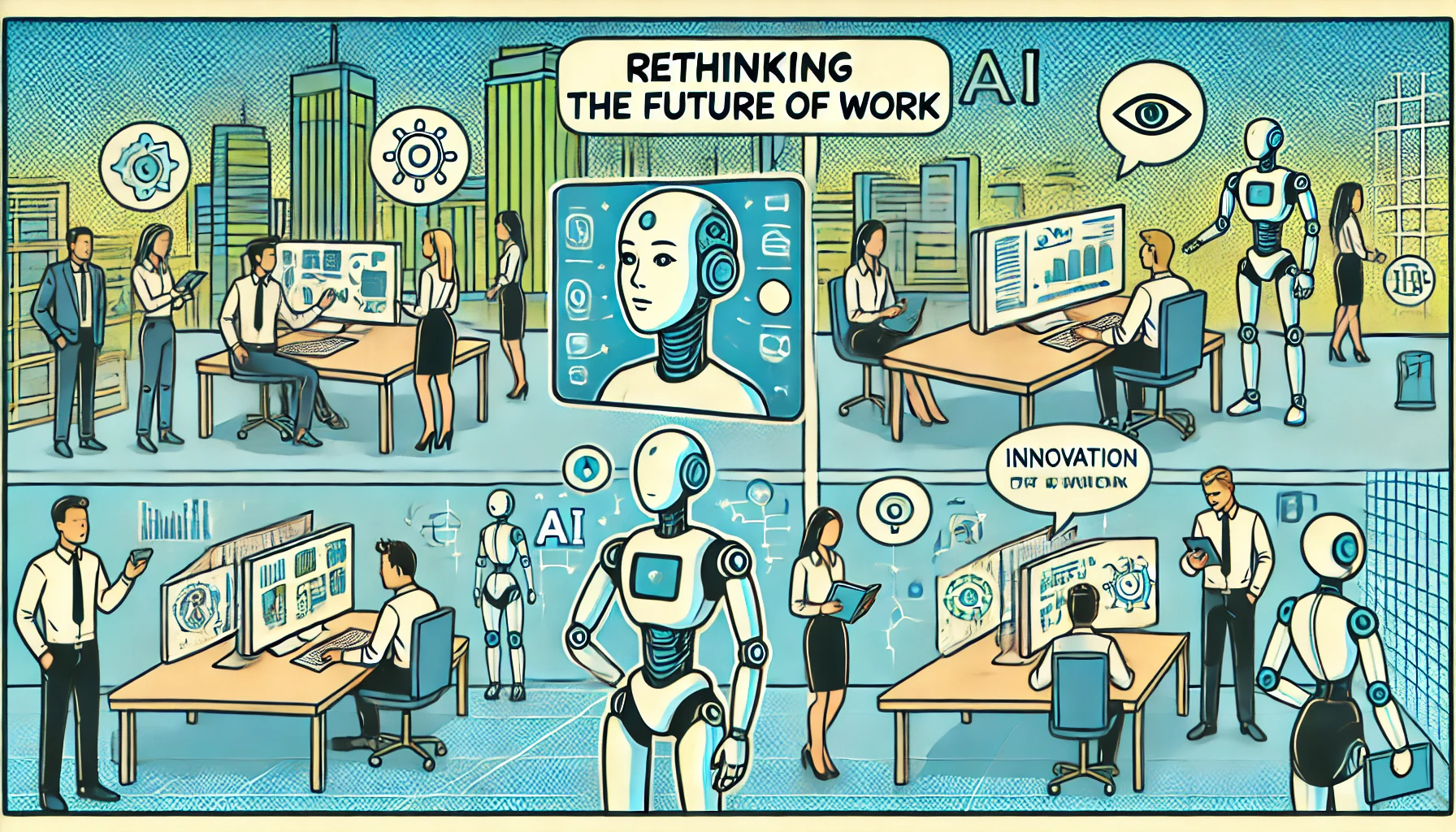In today's rapidly evolving digital landscape, business automation has become a crucial element for organizations looking to remain competitive and drive growth. Our cutting-edge 5-day training program, designed to equip professionals with the necessary skills and knowledge to implement automation solutions effectively, is your ticket to staying ahead in the industry. This comprehensive course covers everything from the history of business transformation to the practical implementation of automation opportunities, ensuring a well-rounded and in-depth understanding of the subject matter.
Our training program begins with an introduction to the world of business automation, highlighting historical paradigm shifts and their impact on industries. This foundation allows participants to grasp the significance of automation in the current digital era, as well as the correlation between business automation investment and market performance.
The program then delves into the exciting realm of AI and robotics, exploring the various types and degrees of automation. Participants will learn to distinguish between simple software macros and advanced AI-driven solutions, while gaining insight into the characteristics and capabilities of RPA 2.0. With a focus on real-world case studies, this module equips attendees with the skills to identify the right automation solution for their organization.
Understanding the costs and benefits of implementing automation is essential for any business considering such a transformation. Our program covers the total cost of ownership for digitization, typical expenses incurred by organizations with manual processes, and the primary beneficiaries of automation. Through practical group activities, participants will learn to conduct cost-benefit analyses, enabling them to make informed decisions about automation initiatives.
The training program also addresses the crucial aspect of identifying and implementing automation opportunities. Participants will learn the basics of automation strategy, stakeholder management, and the stages of implementation. Hands-on workshops will guide attendees in identifying and prioritizing automation opportunities within their own organizations, ensuring a seamless transition from theory to practice.
Finally, our course concludes with a recap of key concepts, group presentations, and a certification quiz. This comprehensive approach guarantees that participants leave with a deep understanding of the subject matter and the ability to apply their newfound skills in real-world situations.
In conclusion, our 5-day training program on business automation offers a unique opportunity for professionals to gain a comprehensive understanding of the subject and learn how to implement automation solutions effectively. By participating in this course, you will be better equipped to navigate the complexities of the digital era and revolutionize your organization's operations for the better. Don't miss the chance to stay ahead of the curve—enroll in our training program today!
• Business leaders and decision-makers: CEOs, CTOs, CIOs, and other executives looking to strategize and implement automation initiatives within their organizations to improve efficiency and drive growth.
• IT professionals: System administrators, software developers, IT managers, and other IT specialists who need to understand the technical aspects of automation and AI-driven solutions to support their organization's digital transformation.
• Project managers and business analysts: Professionals responsible for identifying, evaluating, and implementing automation opportunities within their organization to optimize processes, reduce costs, and enhance overall performance.
• Operations and process managers: Professionals overseeing business processes and operations, who want to improve efficiency, reduce errors, and streamline workflows through the use of automation technologies.
• Human resources and organizational development professionals: HR and OD practitioners who want to understand the impact of automation on the workforce and develop strategies for reskilling and upskilling employees to meet the demands of the digital era.
• Finance professionals: CFOs, finance managers, and other financial professionals who need to evaluate the costs and benefits of implementing automation solutions, as well as monitor and manage the financial aspects of digitization initiatives.
• Sales and marketing professionals: Individuals who are looking to leverage automation technologies to enhance customer interactions, improve lead generation, and optimize marketing campaigns.
• Consultants and advisors: Professionals who provide guidance on business transformation and automation strategies to clients across various industries.
By attending this course, participants from these diverse professional backgrounds will be able to make informed decisions, identify automation opportunities, and implement effective strategies to drive their organizations' digital transformation
- Understand the significance of automation in the digital era and identify key concepts in automation, AI, and robotics
- Evaluate and select the right automation solution for their organization based on specific needs and goals
- Conduct cost-benefit analyses of implementing automation solutions and analyze the total cost of ownership for digitization
- Develop a solid automation strategy, considering key stakeholders and stages of implementation
- Identify, prioritize, and plan for automation opportunities within their organization
- Apply best practices for implementing automation solutions, ensuring smooth transitions and minimal disruptions
- Understand the impact of automation on the workforce and develop strategies for reskilling and upskilling employees as needed
- These seven outcomes encapsulate the most important aspects of the training program, ensuring delegates gain a well-rounded understanding of business automation and the practical skills necessary to drive digital transformation in their organizations





- Course overview
- Historical context of business transformation
- Key terms and concepts in automation
- Paradigm shifts and their impact on industries
- Market performance correlation with business automation investment
- Identifying automation opportunities
- Types and degrees of automation
- Characteristics of intelligent automation
- Capabilities of RPA 2.0
- Factors to consider when choosing an automation solution
- Case study analysis
- Total cost of ownership for digitization
- Typical expenses incurred by organizations with manual processes
- Identifying the primary beneficiaries of automation
- Cost-benefit analysis of implementing automation
- Automation strategy basics
- Identifying key stakeholders for an automation team
- Stages of implementation
- Prioritizing automation opportunities
- Review of Key Concepts












Training can take place in 4 formats:
- Self-paced
- Blended learning
- Instructor-led online (webinar)
- Instructor-led offline (classroom)
Description of training formats:
- Self-paced learning or e-Learning means you can learn in your own time and control the amount of material to consume. There is no need to complete the assignments and take the courses at the same time as other learners.
- Blended learning or "hybrid learning" means you can combine Self-paced learning or e-Learning with traditional instructor-led classroom or webinar activities. This approach requires physical presence of both teacher and student in physical or virtual (webinars) classrooms or workshops. Webinar is a seminar or presentation that takes place on the internet, allowing participants in different locations to see and hear the presenter, ask questions, and sometimes answer polls.
- Instructor-led training, or ILT, means that the learning can be delivered in a lecture or classroom format, as an interactive workshop, as a demonstration under the supervision and control of qualified trainer or instructor with the opportunity for learners to practice, or even virtually, using video-conferencing tools.
When forming groups of students, special attention is paid to important criteria - the same level of knowledge and interests among all students of the course, in order to maintain stable group dynamics during training.
Group dynamics is the development of a group in time, which is caused by the interaction of participants with each other and external influence on the group. In other words, these are the stages that the training group goes through in the process of communicating with the coach and among themselves.
The optimal group size for different types of training:
- Self-paced / E-learning: 1
- Instructor-led off-line (classroom): 6 – 12
- Instructor-led on-line (webinar): 6 – 12
- Blended learning: 6 – 12
- Workshop: 6 – 12
- On-the-job: 2 – 4
- Simulator: 1 – 2
Feedback in the form of assessments and recommendations is given to students during the course of training with the participation of an instructor and is saved in the course card and student profile.
In order to control the quality of the services provided, students can evaluate the quality and training programme. Forms of assessment of the quality of training differ for courses with the participation of an instructor and those that are held in a self-paced format.
For courses with an instructor, start and end dates are indicated. At the same time, it is important to pay attention to the deadlines for passing tests, exams and practical tasks. If the specified deadlines are missed, the student may not be allowed to complete the entire course programme.
A personal account is a space for storing your training preferences, test and exam results, grades on completed training, as well as your individual plan for professional and personal development.
Users of the personal account have access to articles and blogs in specialized areas, as well as the ability to rate the completed training and leave comments under the articles and blogs of our instructors and technical authors
Registered users of a personal account can have various roles, including the role of a student, instructor or content developer. However, for all roles, except for the student role, you will need to go through an additional verification procedure to confirm your qualifications.
Based on the results of training, students are issued a certificate of training. All training certificates fall into three main categories:
- Certificate of Attendance - students who successfully completed the course but did not pass the tests and exams can apply for a certificate of attendance.
- Certificate of Completion - students who have successfully completed a course could apply for a Certificate of Completion, this type of certificate is often required for compliance training.
- Verified Certificate - it is a verified certificate that is issued when students have passed exams under the supervision of a dedicated proctor.
You can always download a copy of your training certificate in PDF format in your personal account.
You will still have access to the course after completing it, provided that your account is active and not compromised and Tecedu is still licensed for the course. So if you want to review specific content in the course after completing it, or do it all over again, you can easily do so. In rare cases, instructors may remove their courses from the Tecedu marketplace, or we may need to remove a course from the platform for legal reasons.
During the training, you may encounter various forms of testing and knowledge testing. The most common assessment methods are:
- preliminary (base-line assessment) - to determine the current level of knowledge and adapt the personal curriculum
- intermediate - to check the progress of learning
- final - to complete training and final assessment of knowledge and skills, can be in the form of a project, testing or practical exam
Travel to the place of full-time training is not included in the cost of training. Accommodation during full-time studies can be included in the full board tuition fees.
While Tecedu is not an accredited institution, we offer skills-based courses taught by real experts in their field, and every approved, paid course features a certificate of completion or attendance to document your accomplishment.
You can preview samples of the training materials and review key information about the course on our website. You can also review feedback and recommendations from students who already completed this course.
We want you to be happy, so almost all purchased courses can be returned within 30 days. If you are not satisfied with the course, you can request a refund, provided the request complies with our return policy.
The 30-day money back policy allows students to receive quality teaching services with minimal risk, we must also protect our teachers from fraud and provide them with a reasonable payment schedule. Payments are sent to instructors after 30 days, so we will not process refund requests received after the refund period.
We reserve the right, in our sole discretion, to limit or deny refund requests in cases where we believe there is refund abuse, including but not limited to the following:
- A significant portion of the course has been consumed or downloaded by a student before the refund was requested.
- Multiple refunds have been requested by a student for the same course.
- Excessive refunds have been requested by a student.
- Users whose account is blocked or access to courses is disabled due to violation of our Terms and Conditions or the Rules of Trust and Security.
- We do not grant refunds for any subscription services.
- These refund restrictions will be enforced to the extent permitted by applicable law.
We accept most international credit and debit cards like Visa, MasterCard, American Express, JCB and Discover. Bank Transfers also may be an option.
Conducting classes is based on the fact that the teacher demonstrates text, drawings, graphics, presentations on an interactive board, while the content appears in the student's electronic notebook. A specially designed digital notepad and pen are used to create and edit text and images that can be redirected to any surface via a projector.
Classes are live streamed online, automatically recorded and published on the Learning Portal, allowing you to save them for reuse anytime, anywhere, on any mobile device. This makes it possible not to miss classes and keep up with classes and keep up with the passage of new material.
Real-life training uses the principles of game organization, which allows future professionals to rehearse and hone their skills in a virtual emergency. Learning as a game provides an opportunity to establish a connection between the learning activity and real life.
The technology provides the following learning opportunities:
- Focused on the needs of the user
- Instant feedback
- Independent decision making and choice of actions
- Better assimilation and memorization of the material
- Adaptive pace of learning tailored to the individual needs of the student
- Better transfer of skills learned in a learning situation to real conditions
Basic principles of training:
- A gradual increase in the level of difficulty in the game;
- Using a simplified version of a problem situation;
- Action in a variable gaming environment;
- The right choice is made through experimentation.
The main advantages of Game Based Learning technology:
- Low degree of physical risk and liability
- Motivation to learn while receiving positive emotions from the process;
- Practice - mirroring the real situation
- Timely feedback
- Choice of different playing roles
- Learning in collaboration
- Developing your own behavior strategy
Conducting practical classes online using remote access technologies for presentations, multimedia solutions and virtual reality:
- Laboratory workshops that simulate the operation of expensive bench equipment in real production
- Virtual experiment, which is visually indistinguishable from a remote real experiment performed
- Virtual instruments, which are an exact copy of real instruments
- Mathematical modeling to clarify the physical characteristics, chemical content of the investigated object or phenomenon.
















